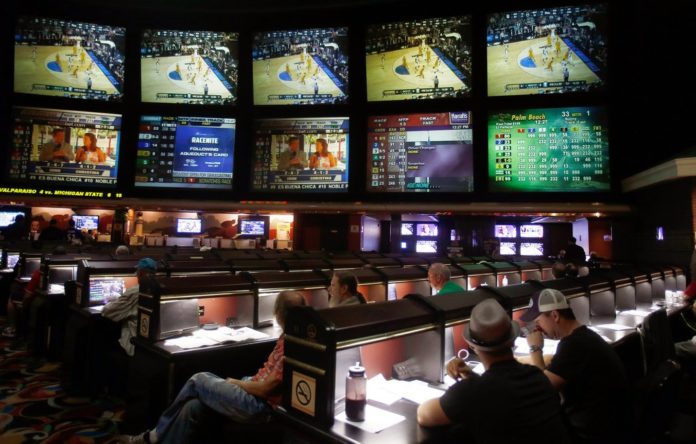The Legislature took a step toward authorizing sports wagering Wednesday when the Senate passed a bill that sets up a collision with the House that could decide whether Kansas becomes the 26th state to allow sports betting.
The Senate voted 26-12 to pass a bill authorizing the state’s four casinos to contract with the Kansas Lottery to manage and operate a sports book on behalf of the state.
Each casino may use up to three mobile apps approved by the lottery to conduct sports wagering. The apps could only accept bets from somone physically in the state.
The bill also would allow betting at the Kansas Speedway in Kansas City, Kansas, as well as Children’s Mercy Park, home of Sporting Kansas City.
While Wednesday’s development is a significant step forward, there is still a deep gulf between the bill that passed in the Senate and one that’s awaiting action in a House committee.
“We do have a long way to go on this bill,” said Republican state Sen. Jeff Longbine, the lead sponsor of the sports wagering legislation.
The Emporia lawmaker took a few minutes on the Senate floor to explain the differences with the House bill, which is broader in scope.
The House bill would impose taxes much higher than what other states collect from sports wagering.
The House bill would tax online sports betting revenues at 20% and in-person betting at casinos at 14%.
The tax rate would only be less than Rhode Island (51% of gross gaming revenues), Delaware (50% of revenue) and Pennsylvania (36% of gross gaming revenue), according to an analysis by legislative researchers.
It would be equal to Tennessee, which collects 20% of revenues.
The Senate bill, meanwhile, collects 5.5% from sports bets placed in person at a casino and 8% of from bets placed online.
Among other things, the House bill calls for allowing sports betting at up to 1,200 retailers that sell lottery tickets across the state.
Casino executives say the House bill would give Kansas more locations to gamble on sports than any state in the country.
Longbine said the House bill would put the Kansas Lottery in a position of regulating itself if bets could be placed at lottery retailers.
Under the Senate bill, Longbine said, the casinos would assume the risk of all bets placed.
The House bill, he said, would put that risk on the state because sports bets could be placed at retail outlets where lottery tickets are sold.
“Under our bill, the gaming facility managers take all of the risk on the wins and losses,” Longbine said.
“The state is going to collect based on volume. We will not take the risk on individual bets.”
The House bill, Longbine said, would make Kansas taxpayers responsible for the wins and losses.
“There will be an argument that it will even out over time,” he said.
But Longbine pointed to Rhode Island, where football fans in 2019 legally bet $6.5 million on the Super Bowl.
The state sportsbooks reported losing $2.35 million after the Patriots won and covered the spread.
“I don’t want to have to explain to my taxpayers why I am betting their tax dollars,” Longbine said.
Longbine said it would be best for Kansas to stay out of the gambling business and leave it to the state’s casino managers and the lottery to carry out the law once it’s enacted.
“I think we’ve got a really good strong model,” he said. “We have a number of components in the bill to make sure it’s done properly.”
















